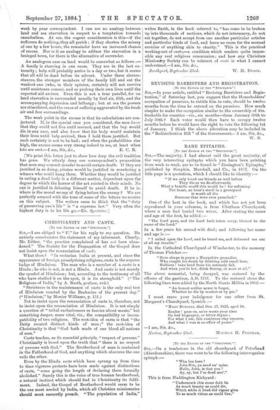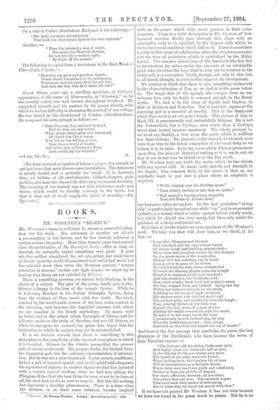[To THE EDITOR OF THE "SPECTATOR."'
SIR,—On a tombstone in the old churchyard of Peterhead (Aberdeenshire), there was wont to be the following interrogative
epitaph :— " Wha lies here ?
John Sim, ye need na' spier. Hullo, John, is that you ? Ay, ay, bat I'm deed noo'."
This is from Haddington Kirkyard :
"Underneath this stone doth lie As much beauty as could die, Which while it lived did vigour give To as much virtue as could live."
On a slab in Cullen (Banffshire) Kirkyard is the following:—
" Hic jacet Johannes Aberdonensis
Who built the churchyard dyke at his own expensis."
Another :—
"Here lies interred a man o' micbt, His name was Malcolm Downie,
He lost his life a market night, By fa'in' off his pownie."
The following is copied from a tombstone in the East Neuk o' Fife—Crail, I think :—
" Here lies my good and gracious Auntie, Wham Death has packed in his portroanty, Threescore and ten years God did gift her, And here she lies, wha de'il dears lift her ?"
•
About fifteen years ago a strolling musician, of distingu6 appearance, of the name of Abercromby, or "Crummy," as he was usually called, was well known throughout Scotland. He supported himself and his partner by his penny whistle, with which he had no difficulty in charming the musical of any village.
He was buried in the churchyard of Cruden (Aberdeenshire). He composed his own epitaph as follows :—
"Here Crummy lies, enclosed in wood, Full six feet one and better'
When tyrant Death grim o'er him stood, He faced him like a hatter.
Now lies he low without a boot, Free from a world of bustle, And silent now is Crummy's flute, And aweful dry his whustle."
[We have received a number of letters it pro pos of a remark in our last issue that most thieves were teetotallers. The statement is utterly denied, and is probably too broad. It is, however, true, we believe, of all card-sharpers, billiard-sharpers, pick- pockets, and men who depend for their prey on manual dexterity. The meaning of our remark was not that abstinence made men worse, which would be directly contrary to the truth, but that it does not of itself supply the place of morality.—En. Spectator.]

































 Previous page
Previous page